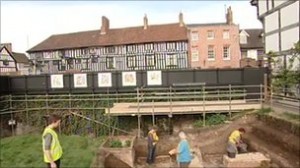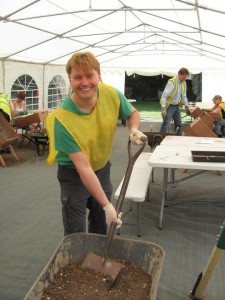Heeding the call: Stumbling into Shakespeare’s cellar
In this second in a series on the realities of being a being a travel writer, I want to mention something that is not only important to travel writing, but to the essence of good travel itself: Be open to surprising detours.
Case in point: A couple years ago I received an assignment to visit England’s Duxford Royal Air Force Base, a historic airfield in the countryside just outside of Cambridge. Duxford is part of the Imperial War Museum and hosts the world’s premier collection of vintage warplanes. I was to write about the base, its history (it played a significant role in WWII) and its amazing array of famous fighters.
While making my way north from London, I made a point to stop at one of my favorite places, the charming town of Stratford-Upon-Avon. The picturesque town, about a hundred miles from the capital, is known the world over for its Shakespeare connection: The great man himself was born here (his childhood home is still there) and then retired to a nearby home after his dazzling career in London.
It was during my visit to Stratford (which was intended to be a quick one) that I heard about an archeological excavation being done at the site of New House, the home where Shakespeare spent in his final years. The home was demolished in the 1800’s, and took with it information about the man’s last decades.
Overseen by the Birmingham University Archeological Unit, the dig aimed to get some answers about the man behind the legend. To do that, large swaths of the property were being excavated. I took one look at the historic undertaking and decided I needed to find a way to be involved.
I introduced myself to the lead archeologist and got in touch with the head of the project. I explained that I was a visiting American travel writer and that I’d love to write an article about the dig. I asked to assist on the excavation in order to get a better feel for the project. Before I knew it, I had been ushered onto the grounds, issued a yellow vest, and given a quick tutorial in proper excavating.
The next day I was kneeling in the dirt, sweating heavily under the sweltering summer sun and scraping centuries of dirt from Shakespeare’s cellar floor. Trowel in hand, I followed the exposed lines of Elizabethan brickwork with my eyes. These lines formed the foundations of the Bard’s final home. It was thrilling to be a part of uncovering history.
My tenure as a pseudo-archeologist ended a week later when I decided I had all the research material I needed (translation: I was tired, sunburned, and out of clean clothes). I turned in my trowel and headed northward for the Duxford base.
I kept the yellow vest, though.
The Duxford visit went well, and the resulting story was successful. But the Shakespeare article remains one of my favorite pieces, and the experience was one of a kind. There were other incidents related to that visit, but those will not make it into the pages of a travel publication anytime soon. And none of them have happened if I hadn’t kept my antennae alert for a good story and then made the effort to get involved.
The moral of the story is that while a travel writer must get his story, he also must listen when a better one calls out.
Heed the call.



Category: General, On The Road, Travel Writing